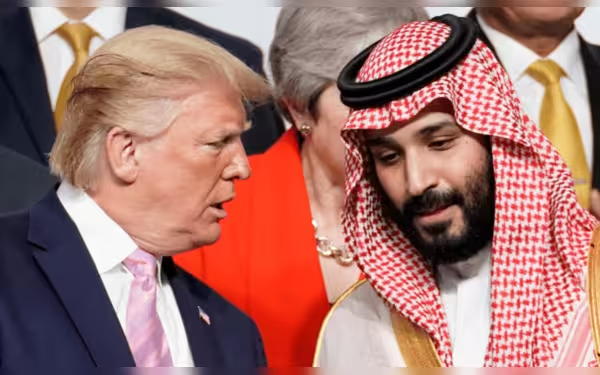Monday, December 23, 2024 01:42 AM
Saudi Arabia Shifts Focus from US Defense Treaty to Limited Military Cooperation
- Saudi Arabia abandons US defense treaty pursuit over Israel issues.
- Crown Prince ties Israel recognition to Palestinian statehood progress.
- Limited military pact may be finalized before Biden's term ends.
 Image Credits: dawn
Image Credits: dawnSaudi Arabia abandons its pursuit of a US defense treaty, focusing instead on limited military cooperation amid rising tensions over Israel.
In a significant shift in diplomatic strategy, Saudi Arabia has decided to abandon its pursuit of a comprehensive defense treaty with the United States, which was initially tied to the normalization of relations with Israel. This decision comes amid rising public anger in Saudi Arabia and the broader Middle East regarding Israel's military actions in Gaza. Instead, Riyadh is now advocating for a more modest military cooperation agreement with Washington.
Earlier this year, Saudi Arabia had softened its stance on Palestinian statehood, suggesting that a public commitment from Israel to a two-state solution could pave the way for normalization. However, the current political climate has forced Crown Prince Mohammed bin Salman to make recognition of Israel contingent upon concrete steps towards establishing a Palestinian state.
Israeli Prime Minister Benjamin Netanyahu remains eager to achieve normalization with Saudi Arabia, viewing it as a historic milestone that would signify broader acceptance in the Arab world. Nevertheless, he faces significant domestic opposition to any concessions regarding the Palestinians, especially following the Hamas attacks on October 7, 2023. This domestic pressure complicates the prospects for a comprehensive treaty.
As both leaders navigate their respective political landscapes, there is hope that a more limited defense pact could be finalized before U.S. President Joe Biden's term ends in January. Such an agreement would not require Senate approval, unlike a full-blown treaty, which would necessitate a two-thirds majority and would be unlikely without Saudi recognition of Israel.
The proposed pact would focus on expanding joint military exercises and enhancing partnerships between U.S. and Saudi defense firms, while also ensuring that there is no collaboration with China. Additionally, it would promote Saudi investment in advanced technologies, particularly in drone defense. The U.S. is expected to increase its military presence in Saudi Arabia, providing training, logistics, and cyber security support, and may even deploy a Patriot missile battalion to bolster missile defense capabilities.
However, this agreement will not provide the same level of military protection that a mutual defense treaty would offer, which would obligate U.S. forces to defend Saudi Arabia in the event of an attack. As Abdelaziz al-Sagher, head of the Gulf Research Institute, noted, "Saudi Arabia will get a security deal which will allow more military cooperation and sales of U.S. weapons, but not a defense treaty similar to that of Japan or South Korea as initially sought."
The situation is further complicated by the potential return of Donald Trump to the White House. Trump's approach to the Israeli-Palestinian conflict does not include provisions for Palestinian statehood, yet he remains a close ally of the Saudi crown prince. This raises concerns among Palestinian and Arab officials about the implications of Trump's influence on Saudi priorities.
Despite the challenges, the current U.S. administration has not abandoned hopes for a security agreement before Biden leaves office. However, time is of the essence, and skepticism remains regarding the feasibility of reaching a deal. U.S. officials are aware that Saudi Arabia is still interested in formalizing security guarantees, particularly to access advanced weaponry, but it remains unclear whether they prefer to finalize this under Biden or wait for Trump.
The evolving dynamics between Saudi Arabia, the U.S., and Israel highlight the complexities of Middle Eastern diplomacy. As the region grapples with longstanding conflicts and shifting alliances, the outcome of these negotiations will not only impact the involved nations but also shape the broader geopolitical landscape. The path forward remains uncertain, but the stakes are undeniably high for all parties involved.













